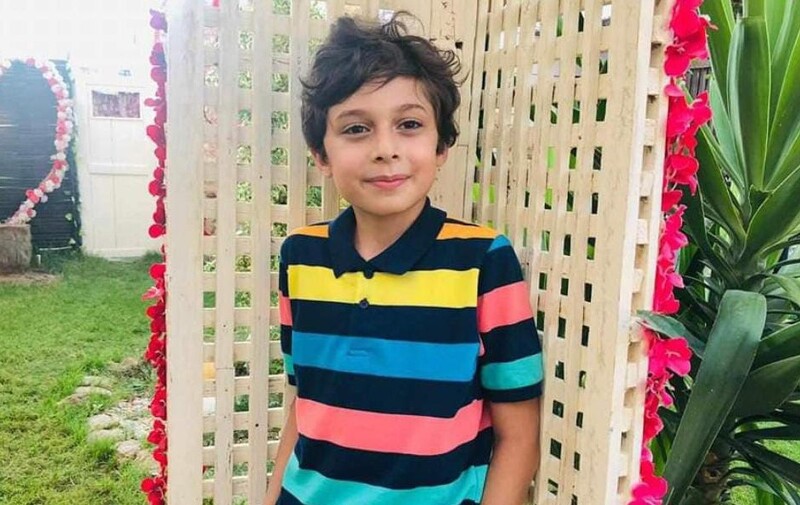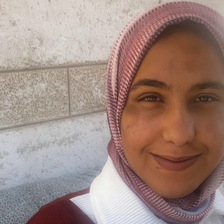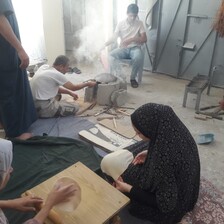The Electronic Intifada 12 September 2024

Ismail was 14 when he was killed in an Israeli airstrike.
One day in December 2023, Aysha al-Najjar was listening to the news while her daughter Luna, 15, was bathing.
Her husband, Muhammad, an accountant with the ministry of finance before the genocide, had gone to locate some water, and her son, Ismail, 14, was playing football with relatives.
Suddenly, in the blink of an eye, everything around Aysha lit up, then everything rose up and came crashing down.
Aysha, 37, and her family had moved from the Tal al-Hawa area of Gaza City to the al-Qarara area in Khan Younis in October 2023. They left behind a three-storey house with a front yard that used to be abundant in flowers and trees and a backyard for their two children to play in.
Israel’s indiscriminate bombing campaign was particularly intense in the early weeks and months, and did not spare anyone, people or animals. Aysha and her family felt the horror, especially at night.
They ate canned food and spent large parts of their days finding firewood for cooking and locating water.
And the bombardment followed them south.
Like all children, Ismail was scared by the bombing. But he tried to be brave, said his mother.
When he heard the bombings, he would move close to his mother, saying: “I’m a big man, mama. Their rockets don’t frighten me. I’m coming close to reassure you.”
“We got close to reassure each other,” Aysha said.
But Israel’s war planes did not spare the two-floor apartment building to which Aysha’s family had moved.
Killing the innocence
On that fateful day in December, Aysha remembered coughing under the rubble with dust on her face, sand in her eyes and the smell of gas in her nose. It was difficult to see or breathe.
She realized the house had been struck, and immediately started worrying about her children. But when she tried to get out from underneath the rubble that had collapsed on top of her, she found it impossible to get free.
She couldn’t feel her legs. She tried her best to move her belly and pelvis and push away the stones around her. She felt pain in her shoulder and saw blood on her hands and clothes. Aysha realized that she would likely only make her injuries worse if she kept trying to move.
She shouted for her husband. She called out to her children, as well as her father and other relatives who were in the building.
The last thing she remembers, she told The Electronic Intifada, was shouting and the cries of her husband and sister, the sounds of an ambulance and of many men moving stones and looking for her and her family.
It was the familiar voice of her husband that was her next memory.
Slowly, Aysha woke to find herself in a hospital bed at Nasser hospital, her legs and shoulders bandaged.
In the bed next to her, she saw, with some difficulty, her daughter, Luna, “burns on her beautiful face.”
The news only got worse. A number of relatives had been killed in the airstrike. Her father and brother included. And Ismail.
“When I gave birth to my beloved son, doctors told me that he had a weak heart and would not live long. I didn’t know that his end would be a martyrdom as beautiful and harsh as this,” Aysha told The Electronic Intifada.
Treatment abroad
Weeks passed. Aysha underwent a number of operations and was beginning to regain some strength. Physically she was getting stronger. Mentally she was adapting.
Then, on 21 January, the hospital was surrounded by the Israeli military. For days, doctors and patients could only eat dates.
Then, after some two weeks, the soldiers entered.
The first thing they did, said Aysha, was arrest the medical staff. Then they collected the patients and moved them all into one room to be interrogated.
Aysha said she was questioned for six hours – which “felt like six years” – about things she knew nothing about: are her neighbors Hamas, do any Hamas people live nearby, where are the tunnels.
They even showed her pictures of detainees in Israeli prisons and asked whether they were members of Hamas.
“Those were very difficult hours,” Aysha said.
The fear and stress, she believes today, made her health worse. Indeed, eventually it was decided that she had to leave Gaza to receive proper medical attention.
She waited two months.
In March, Aysha and a sister finally got permission to leave to Egypt. They later moved to Qatar, where they are today.
“I left, but I could never leave behind the image of my son, my father and my brother all being torn into pieces by an Israeli bomb,” she said.
But, she added, she tries to stay strong.
“I’m the mother, daughter and sister of martyrs. This pride is enough for me,” she said over the phone. “I should be strong. I should be an example.”
Unlike the vast majority of Palestinians in Gaza, Aysha’s family were not refugees from 1948. But, she said, she now knows how they felt, even though, as she put it, what’s “happening now is worse than 1948 and 1967.”
She said that though safe in Qatar, she could not feel any kind of tranquility because of what is happening back home.
“I should have had more children … Ismail is killed but Palestinian women will give birth to many more like him.”
Hanin A. Elholy is a researcher, writer and translator based in Gaza.





